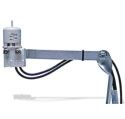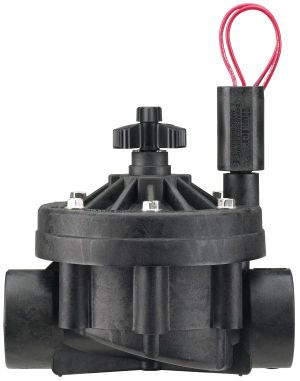FAQ | Tips
Email us and get a quick answer
Q: Why would my sprinkler system continue running even after the controller is unplugged?
A: There are a few reasons why your sprinklers would continue running:
- It is possible that your valves have been opened manually. You will need to locate your valve box(es) and twist the solenoid(s) on the valves clockwise until snug. The solenoid is located on the top of the valve and looks like a cylinder with two wires coming out of it.

- It is possible that you have debris in the valve, which is causing them to remain open. To fix this, you’ll need to disassemble the valve, rinse all the parts with clean water and re-assemble the valve. It is better to leave this to a pro.
- The diaphragm in the valve is bad and needs to be replaced. It is better to leave this to a pro.
A: Located in your front yard is a double check. Depending on which city you live in, they are normally located within 3 feet of your water meter between the sidewalk and street. The device is housed under a green rectangular lid. Open the lid and you should see two handles. Turn either one of the handles (it doesn't matter which one) until it is inline with your double check, which is about a quarter turn. This will turn off the fresh water supply to your sprinkler system only and will not affect the water to your home. In some cases, if you have a pool, it will turn off your water to the pool as well, so be sure to check that.
Q. What is a Controller?
A: The controller is the brains of an irrigation system. The irrigation will come on and off as you wish, simply by inputting which days to water, how long to water, and what time to start. Controllers can be installed indoors or outdoors. An important feature to have on a controller is the ability to bypass the rain sensor.
Q. What is a Rain Sensor?
A: A rain sensor is a device that prevents an irrigation system from running after sufficient rainfall has met the adjustable threshold of the device. Rain sensors for irrigation systems are available in both wireless and hard-wired versions, most employing hygroscopic disks that swell in the presence of rain and shrink back down again as they dry out - an electrical switch is in turn depressed or released by the hygroscopic disk stack.
Q. What is an Electric Valve?
A: Each zone of an irrigation system has an electric valve. Wires are installed from the valve to the controller. The electric valve opens and closes based on the programming scheduled in the controller. When the valve receives a 24 volt signal from the controller, the valve opens and allows water from the mainline to flow throughout the piping and to the sprinklers of that particular zone.
Q: How soon can you repair my sprinkler system?
A: We offer same or next day service, Monday-Saturday, from 8:00am to 6:30 pm. We do offer 24 hour service, however, additional fees do apply.
Q: Do you have parts for my sprinkler system?
A: We pride ourselves on having a fully stocked truck with eveyr imaginable sprinkler part needed to repair a system. We will NEVER tell you we need to go get a part and you end up paying for travel time.
Q: Do you offer a warranty on repairs
A: Absolutely! We give a one year warranty on all repairs we do.
Q: How often should I water?
A: It's hard to answer this question with one simple answer. There are many different types of variables, slope, sun/shade tolerance, pop up or rotor head. As a general rule of thumb, it good to water 3 days per week in the hot months, 2 days per week in the cool months and one day per week in the cold months, if needed. I would water as long as you can on each zone up until the point you see water starting to run down the sidewalk or street or until it pools. If you continue to water longer than that, you're wasting water and money. If that amount of time is not long enough to keep your lawn or landscaping healthy, consider watering in cycles. watering in cycles means, you may water one zone for XX minutes, then you let all the zones on the netire system water, then it starts over again with the second cycle. This allows the soil time to absorb the water and gets the water deeper into the soil. If you would like a more detailed answer on your particular yard, you can email us and we would be happy to offer you suggestions by email. There's no obligation or commitment, were just trying to help conserve water.
Q: What is the best time to water?
A: Early morning, around 5:00 am. This allows the water to be absorbed by the ground before it gets too hot and evaporates.
Q: I have had my sprinklers turn off for a while, but still have a wet spot in my yard.
A: More than likely, it is a main line leak. To fully understand this, I need to explain the basic functions of a sprinkler system. Starting from the water meter, you have a back flow device connected. This leads to the different valves in your yard that controls the zones. When your controller tells the valve to come on, it is then opened and waters that part of your landscaping for ever how many minutes you have it set for. Even though your controller is turned off, there is still water in the main line pipes going from the double check to each valve. This is most likely what is leaking.
